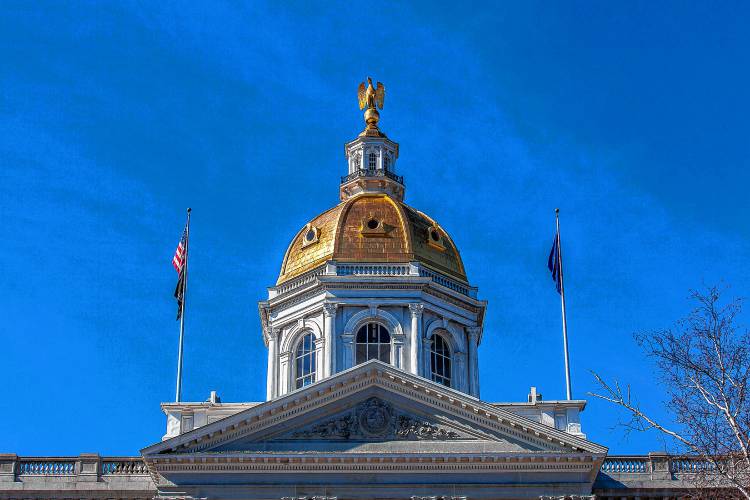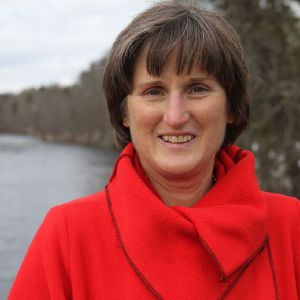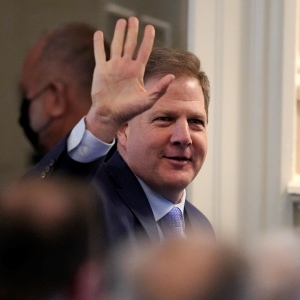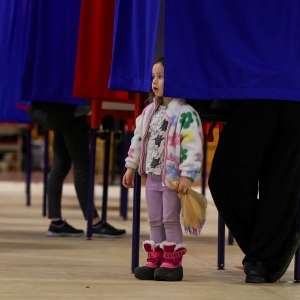Budget top of mind for New Hampshire legislators

ELIZABETH FRANTZ/Monitor staff, file
| Published: 01-07-2025 11:18 AM |
WEST LEBANON — The biennial state budget is first thing on the minds of Upper Valley elected officials headed to Concord this legislative session, which begins Wednesday.
So far, state agencies have submitted their budget requests totaling $16.9 billion, according to the New Hampshire Fiscal Policy Institute.
Republican Gov.-elect Kelly Ayotte will present a recommended budget to lawmakers in February.
“Most of my waking hours of concern reflect the upcoming budget season,” said Rep. Mary Hakken-Phillips, D-Hanover, a member of the House Finance Committee.
The budget will first go through the House and then the Senate to make changes before it is approved or vetoed by the governor.
The budget is set every two years, with the fiscal year 2026-2027 budget going into effect July1. So it’s too early to tell what the final budget will look like, said Rep. Margaret Drye, R-Plainfield, who began her first term in 2022. She is considering the budget requests “with a grain of salt” because most of the revenues and expenditures under consideration are still projections.
“Things look very different right now than they will look in a few months,” Drye said. “The first speech I heard from Gov. Sununu, a lot of that never even played out down the road.”
While legislators across Concord said the budget was top of mind this year, Democrats, including Hakken-Phillips, say they are particularly concerned about potential shortfalls in revenue.
Article continues after...
Yesterday's Most Read Articles
 ‘Field of Dreams’ to ‘a dump’ – What golfers have to say about Concord’s plans to rebuild the Beaver Meadow clubhouse
‘Field of Dreams’ to ‘a dump’ – What golfers have to say about Concord’s plans to rebuild the Beaver Meadow clubhouse
 Man dies in RV fire in parking lot of Concord’s Steeplegate Mall
Man dies in RV fire in parking lot of Concord’s Steeplegate Mall
 ‘New Hampshire is just going to embarrass itself’: Former Child Advocate warns against proposed office cuts
‘New Hampshire is just going to embarrass itself’: Former Child Advocate warns against proposed office cuts
 John Swope, longtime Concord civic leader who spearheaded Capitol Center for the Arts, dies at 86
John Swope, longtime Concord civic leader who spearheaded Capitol Center for the Arts, dies at 86
 N.H. mulls immigration bill to ban sanctuary policies and overrule local control
N.H. mulls immigration bill to ban sanctuary policies and overrule local control
 Photos: An update on some of the Concord’s springtime building projects
Photos: An update on some of the Concord’s springtime building projects
These stem from the loss of federal COVID-19 relief funds, ongoing litigation and decisions to cut certain taxes.
In the 2023-24 budget process, Republicans fast-tracked the phasing out of a tax on certain earnings — such as stocks — that was paid by about 13% of residents in 2023, most of whom have high incomes, according to the New Hampshire Fiscal Policy Institute.
In fiscal year 2023, the tax brought in $147 million, according to state financial reporting.
“This is a significant revenue source for our state and without this, the tax burden is now going to fall most heavily on our more vulnerable communities and no longer the rich folks who were paying that tax,” Hakken-Phillips said.
For his part, Sen. David Rochefort, R-Littleton, said he expects that the Legislature will address budget concerns with a focus on “doing the best for the people in the most efficient way possible,” adding that “this first year of the cycle really we have to get our financial house in order and move forward.”
Another question hanging over the budget is the cost of more than 1,000 lawsuits alleging abuse at the Sununu Youth Services Center in Manchester, the state’s youth detention center, according to Hakken-Phillips and other Democrats, including Executive Councilor Karen Liot Hill, D-Lebanon.
The total cost of the lawsuits remains unknown, but so far they have cost “hundreds of millions of dollars,” while over 400 cases are still outstanding, Liot Hill said.
“The governor has a real challenge ahead of her to try and make sure that we are meeting the needs of the people of New Hampshire, while at the same time not simply downshifting the costs to local property taxpayers,” Liot Hill said.
In addition to the budget, education, housing and health care also are top of line issues for Upper Valley legislators this session.
Hakken-Phillips said she is concerned about the priorities of the increased Republican majority and generally expects a lot of “culture war legislation” that focuses on LGBTQ+ rights and abortion access this session: “Because we’re talking about these things so much, I think we’re not going to be talking about housing and education and... things that affect the people in our state on more of a day-to-day basis.”
This election cycle, Republicans in the Senate gained two seats for a 16-8 supermajority.
In the House, the Republican majority increased from 201-198 with one vacancy to 222-178 margin.
Drye is watching how a December decision to split the standing House Education Committee into an education finance committee and an education administration committee will play out.
The decision was made to lessen the pressure on representatives to get through a high volume of bills on education.
About 120 bills on education have been filed for this session, Drye said, while the 107 reviewed by a single committee last year “almost killed us.”
She is currently on the Education Policy and Administration Committee, after previously serving on the Education Committee and is unsure how policy will be divided for review.
“We’ll find out if it’s a good idea pretty soon,” she said.
Hakken-Phillips said she is very worried about the restructuring of the education committee. She expects that it will be used as a “political tool” to allow Republicans to separate the debates on policy or cost, without looking at both together.
“It’s a real Pandora’s box,” Hakken-Phillips said.
Education continues to be a top priority in Concord as legislators await the results of ongoing lawsuits around school funding.
The lawsuits allege that the state covers an inadequate amount of funding for public schools and that the current financing system is unfair. A ruling in either could upend lawmakers’ plans.
“Depending on how those come out, we’ll be rolling up our sleeves to address that issue,” said Rochefort, whose district includes the Upper Valley towns of Haverhill and Piermont.
In his former role as a state representative, Rochefort voted in favor of New Hampshire’s Education Freedom Account program that distributes vouchers for qualifying families to use to pay tuition costs for private options.
To Sen. Sue Prentiss, D-Lebanon, the Education Freedom Account program is “totally out of control,” not just because of the annual cost, but because of what she described as a lack of oversight.
“If money is so tight, which it is, we can’t continue to give it away no questions asked,” Prentiss said.
Health care is another issue at the top of representatives’ minds.
Both Prentiss and Rochefort are focused on access to emergency medical care, especially in the rural areas that make up much of their districts.
Prentiss said she supports increased insurance reimbursement for emergency medical services. She’s also working on a second round of legislation promoting health care for women and mothers, the first of which passed during her first term in 2023.
Rochefort, a pharmacist whose district contains five hospitals including Haverhill’s Cottage Hospital, said he supports expediting Medicaid reimbursements for long-term care facilities and removing regulatory barriers that make it difficult to practice health care in New Hampshire.
Such barriers include current regulations that require that a certified pharmacist fill pill bottles, while in other states such tasks are permitted and “off loaded” to other pharmaceutical professionals, Rochefort said by way of example.
One area of agreement may be on the need for more places for people to live.
Legislators across the political spectrum said expanding housing in the Upper Valley is among their top priorities.
The Upper Valley and all of Grafton County is “one of the worst bubbles in the state,” in terms of housing availability, Hakken-Phillips said.
Clare Shanahan can be reached at cshanahan@vnews.com or 603-727-3216.







 ‘A wild accusation’: House votes to nix Child Advocate after Rep. suggests legislative interference
‘A wild accusation’: House votes to nix Child Advocate after Rep. suggests legislative interference  Sununu decides he won’t run for Senate despite praise from Trump
Sununu decides he won’t run for Senate despite praise from Trump Town elections offer preview of citizenship voting rules being considered nationwide
Town elections offer preview of citizenship voting rules being considered nationwide Medical aid in dying, education funding, transgender issues: What to look for in the State House this week
Medical aid in dying, education funding, transgender issues: What to look for in the State House this week
